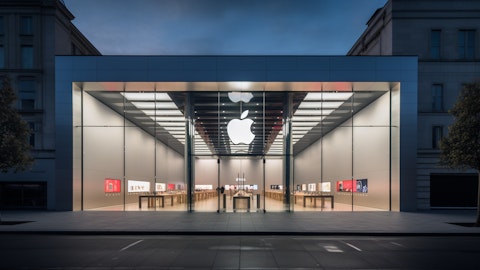We recently compiled a list of the 7 Undervalued European Stocks To Invest In Now. In this article, we will look at where Chubb (NYSE:CB) ranks among the undervalued European stocks to invest in now.
Europe’s Economic Outlook
According to the European Commission’s Economic Outlook, the European economy staged a comeback at the start of 2024, following a prolonged period of stagnation. The growth rate of 0.3%, estimated for the first quarter of 2024, was still below potential but exceeded expectations. The EU economy is expected to grow by 1.0% in 2024 and 1.6% in 2025, while the euro area is expected to grow by 0.8% in 2024 and 1.4% in 2025.
Inflation across the EU cooled further in the first quarter, with inflation projected to decrease from 6.4% in 2023 to 2.7% in 2024 and 2.2% in 2025. The European Central Bank is expected to cut interest rates, with markets expecting a more gradual pace of policy rate cuts than previously expected. Private consumption is expected to expand by 1.3% in 2024 and 1.7% in 2025, driven by continued wage and employment growth. Investment is expected to expand marginally in 2024 before accelerating in 2025, driven by government infrastructure spending and a gradual expansion of investment activity.
The EU’s external demand is expected to rebound, driven by a strong rebound in China’s economic activity and a recovery in global merchandise trade. EU exports of goods and services are expected to expand by 1.4% this year and 3.1% in 2025. The EU government deficit is projected to resume declining in 2024 and 2025, driven by the phase-out of energy-related measures and a gradual improvement in economic activity. The EU fiscal stance is set to be contractionary in 2024 and broadly neutral in 2025.
The Europe’s Market is Undervalued and Overlooked
Nicholas Hyett, investment manager at the Wealth Club, one of the leading investment services companies in the United Kingdom, is optimistic about the European economy, particularly the UK, going into 2024. He notes that the UK market is undervalued, trading 40% below the US, and believes there are growth opportunities in sectors such as consumer goods and industrials. Despite the UK market being perceived as old-fashioned, Hyett argues that it is more dynamic than it appears, with many companies being much cheaper than their US counterparts.
Hyett acknowledges that the UK market is often associated with traditional industries such as oil and gas and mining, which have had a good run in recent years. However, he believes that many other sectors are poised for growth, such as consumer goods and industrials. These sectors have been overlooked by investors in recent years, but Hyett believes that they have the potential to perform well in a strong 2024.
One of the main concerns for investors in 2024 is election uncertainty. The US presidential election is expected to be a major event, and elections are scheduled in Europe. However, Hyett believes that the uncertainty surrounding these elections is already priced into the market. He notes that the UK and European elections are likely to be less of a concern than the US election and that the market is already reflecting this.
In terms of interest rates, Hyett expects that they will be cut in the second half of 2024 and believes that this is a reasonable expectation. However, he notes that the timing and extent of the rate cuts will depend on the economic outlook. If the economy weakens, rate cuts are likely to be more aggressive. On the other hand, if the economy is stronger than expected, then rate cuts may be more gradual. Hyett notes that inflation is expected to drop significantly in 2024, which could lead to rate cuts. However, he also notes that the market is already pricing in a significant drop in inflation and that the timing and extent of the rate cuts will depend on the actual inflation data.
The European economy is poised for a modest recovery in 2024 and 2025, driven by a combination of factors, including a rebound in private consumption, investment, and external demand. While growth rates are expected to remain below potential, the European Commission’s Economic Outlook suggests that the EU economy is on track to return after prolonged stagnation. With that in context, let’s take a look at the 7 undervalued European stocks to invest in now.
Our Methodology
To compile our list of 7 undervalued European stocks to invest in now, we used the Finviz and Yahoo stock screeners to find 40 largest European companies. From that list, we screened for companies that are trading at a forward P/E ratio of under 15, as of September 26. We then narrowed our choices to 7 stocks according to their hedge fund sentiment, which was taken from our database of 912 elite hedge funds as of Q2 of 2024. The list is sorted in ascending order of their hedge fund sentiment, as of the second quarter.
Why do we care about what hedge funds do? The reason is simple: our research has shown that we can outperform the market by imitating the top stock picks of the best hedge funds. Our quarterly newsletter’s strategy selects 14 small-cap and large-cap stocks every quarter and has returned 275% since May 2014, beating its benchmark by 150 percentage points (see more details here).

Chubb (NYSE:CB)
Number of Hedge Fund Investors: 46
Forward P/E Ratio as of September 26: 11.92
Chubb (NYSE:CB) is a Swiss-based global insurance company that offers comprehensive coverage solutions for commercial and personal property, casualty, and accident insurance. The company operates in 54 countries and territories.
The property & casualty insurance industry is expected to have good momentum going forward, especially in personal lines. BeInsure expects property & casualty personal lines to grow 8% in 2024 and 5% in 2025. The industry’s net combined ratio is expected to decline well into 98.5% in 2024 and 2025 compared to 102% ratio in 2023. As a result, the industry’s return on equity is expected to rise from 3.4% in 2023 to 9.5% in 2024 and further to 10.0% in 2025.
In Q2, Chubb’s (NYSE:CB) reported a solid growth in written premiums, with a 10.3% increase in net property & casualty premiums written and a 24.5% growth in life insurance net written premiums. The company’s combined ratio remained stable, and its core operating income per share increased 9.3% year-on-year. Investment income also increased, and Chubb’s (NYSE:CB) EPS of $5.46 grew 26.4% year-on-year, beating expectations by $0.30.
Chubb’s (NYSE:CB) stock remains attractively priced. The company’s good momentum in written premiums and solid earnings, combined with the industry’s low overall risk level, make the stock a good investment opportunity. Chubb (NYSE:CB) is trading at a forward P/E ratio of 13.44 which is a 12.78% discount compared to the industry average of 11.92. Analysts expect the company to increase its earnings by 8.51% this year. As of the second quarter, the stock is held by 49 hedge funds with stakes worth $8.06 billion. Berkshire Hathaway is the largest stakeholder in the company and has a position worth $6.89 billion as of June 30.
Overall CB ranks 4th on our list of the undervalued European stocks to invest in now. While we acknowledge the potential of CB to grow, our conviction lies in the belief that AI stocks hold greater promise for delivering higher returns and doing so within a shorter timeframe. If you are looking for an AI stock that is more promising than CB but that trades at less than 5 times its earnings, check out our report about the cheapest AI stock.
READ NEXT: $30 Trillion Opportunity: 15 Best Humanoid Robot Stocks to Buy According to Morgan Stanley and Jim Cramer Says NVIDIA ‘Has Become A Wasteland’.
Disclosure. None. This article was originally published on Insider Monkey.




